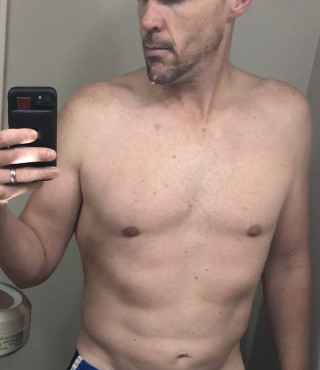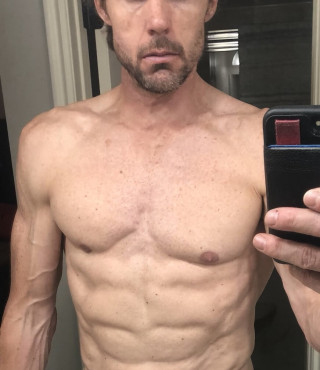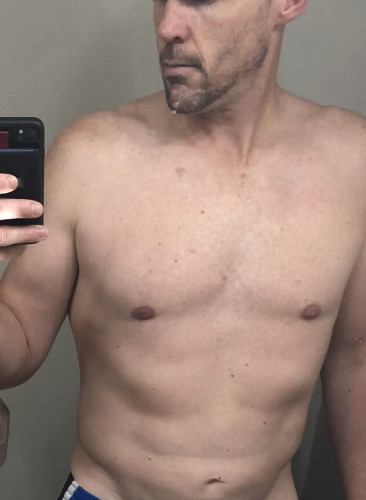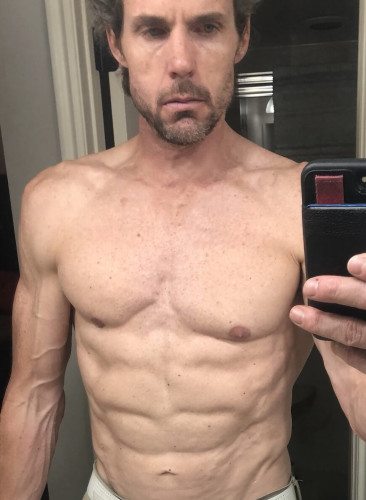

"It's had a lot of impact on others around me who are watching."
How many months’ progress do your pictures represent? What were your stats for each picture?
Starting pic: 6/12/19. 198.8 pounds, 22.1% body fat, 42.15 pounds body fat, 148.5 pounds lean tissue.
Ending pic: 10/13/19. 185 pounds, 10.5% body fat, 18.57 pounds body fat, 158.2 pounds lean tissue.
What has happened so far on the program?
In a span of 4 months, I went from 22.1% body fat and 199 pounds to 10.5% body fat at 185 pounds. I added 10 pounds of lean muscle mass and lost 28 pounds of body fat. All verified by DEXA scans along the way.
What workout split from the book did you use?
Working outcomes easy to me. That’s the part I enjoy. While I did not employ a 5 day or 3 day split, I did learn a lot about progressive overload and volume/frequency/intensity.
I also subscribed to Mike’s strategy of focusing on the big 3 powerlifting movements, which are all compound movements. Squat, deadlift, bench press. Everything else is accessory work.
What, if anything, almost kept you from buying the book or starting the program?
I bought the Bigger Leaner Stronger on the recommendation of a well known personal trainer in the Salt Lake City area, who swore by it and knew it would be a good fit. Based upon his (Eric Turner) recommendation, I never hesitated to buy the book. I had it the next day via Amazon Prime and the rest is history.
As I went through the book, I took the time to calculate my BMR, my TDEE, and my cutting and lean bulking ratios. I’ll be honest, it took me far out of my comfort zone. If you’re going to do it, you have to commit to un-learning a bunch of crap you’ve picked up along the way, so that you can re-learn basics and fundamentals which are irrefutable. It took me from food illiterate to food-literate, at least at a very basic level.
What do you like most about the program?
The logic. The fact that it’s all based on science and fact. Mike backs up every claim he makes with legit clinical studies. There’s no silver bullet food, or special potion, or magic foods that enhance weight loss. It’s pure science and mathematics.
The logic is irrefutable. They are based on basic laws of nature. I have learned so much about food and how my body uses food for energy sources.
How does this program compare with others you’ve tried?
This program is the answer. All the other programs are intended to sell diets based upon half-truths. I understand there are good programs out there, but there are a lot of very bad ones as well. I know keto works for some people. Keto did a lot of damage for me.
I lost a lot of weight, but my body was indiscriminate when it came to eating itself for a food source. It knew no difference between fat and muscle, and therefore attacked both. I have an audit trail of DEXA scans which very clearly illustrate this.
For every pound of fat I lost on keto, I also lost a pound of muscle. 1:1 ratio. It was devastating. For as difficult as losing fat is, gaining muscle is just as hard if not harder.
How has what you’ve achieved with your body changed other areas of your life?
So as to not be that annoying narcissist who constantly obsesses about his own accomplishments, I try to avoid talking about it. However, it’s had a lot of impact on others around me who are watching. At first, they were poking fun when I’d show up with my prepped meals and snacks, watching and tracking everything I ate.
Over time, I started leaning out, and people started becoming more inquisitive. I’ve now had multiple people around me (including their spouses) buy the book and get on the bandwagon. I’ve calculated BMR, TDEE, macro plans and calories for no fewer than 6 people in my office.
Who would you recommend this program to and why?
The question is, who wouldn’t I recommend it to? The science and mathematics and the stripping away of all the murkiness make it a good fit for every human on the planet. Even if all you want to do is educate yourself, you should read the book and track your food for a while. You learn so much about food fundamentals.
Is there anything else you’d like to add?
The hardest part is getting started. At first, tracking feels daunting and burdensome. The first handful of times you prep your food, it feels overwhelming. But once you get into the rhythm with all of it, and you see how it all works and comes together, it becomes sort of therapeutic.
Without thinking, you start to look at nutrition panels and understand how a particular food is going to impact your macros and your calorie count.
Your habits in the aisles at the grocery store change. You learn what order to get things done in. Don’t feel like you have to follow Mike’s food prepping verbatim. Figure out what works for you.
One of the lessons I learned was to go protein early in the day. It’s easy to catch up on carbs and fat if you need to. However, it normally ends up regulating out by the end of the day. On the other hand, if you have a sugary carb and fat-laden breakfasts, it can be hard to recover for the day. Play with it and figure out what works for you.
Did you use any Legion supplements?
Yes. Nootropics. I also followed Mike’s recommendation and bought bulk quantities and made my own mix of Creatine, Citruline Malate, and Beta-alanine.











